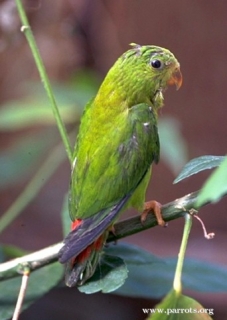Yellow-throated Hanging Parrot |
|
|
Also known as: Javan Hanging Parrot, Little Hanging Parrot
Photos
View in GalleryDid You Know?
Hanging Parrots acquired their name because they normally hang upside down while roosting, head facing downwards.Academic Research
Related publications: Loriculus pusillusSpecies Profile
Genus: Loriculus | Species: pusillus
Size:
12cm (4.7 in)
Weight:
Probably 25-30g (0.9-1 oz).
Subspecies including nominate:
one
Colour Adult:
Both adults in general green; yellow tint to mantle; red rump and tail coverts; orange/yellow mark on throat, minimal in female. Bill orange. Eye yellow/white.
Colour Juvenile:
As in adult female but with little or no yellow on throat. Bill yellow/brown. Eye pale brown.
Call:
Calls made in flight are shrill and high-pitched. Also squeaky chattering while feeding.
Listen NowMore Information:
Content Sources:
CITES
BirdLife International
Cornell Lab of Ornithology/Birds of the World
A Guide to Parrots of the World, Juniper and Parr, 1998
Parrots of the World, Forshaw and Cooper, 1977.
Parrots of the World, Forshaw, 2006.
Lexicon of Parrots, Thomas Arndt.
Parrots in Aviculture, Low, 1992.
Parrots: Their Care and Breeding, Low, 1986.
Photos
View in GalleryDid You Know?
Hanging Parrots acquired their name because they normally hang upside down while roosting, head facing downwards.Academic Research
Related publications: Loriculus pusillusSpecies Care
Captive Status:
Rare
Longevity:
Not recorded.
Housing:
Outdoor enclosure (in warm climates), minimum length 1.5m (5 ft) with enclosed shelter, for 1-2 pairs.
Diet:
Fruits such as: apple, pear, mango, cut into halves; fruits in season like pomegranate, guavas, cactus fruits and berries such as blackberries and red currants; small seed mix such as: canary, millet and soaked oats; spray millet; sponge cake and nectar; insectivorous mixture, mealworms, well-cleaned maggots and ant pupae.
Enrichment:
Vigorous chewers, so provide bird-safe, unsprayed flowering, pine, fir, willow or elder branches; wooden and vegetable tanned leather toys (discard when dirty). Also enjoy bathing so provide overhead misters or shallow bowls of water.
Nest Box Size:
Vertical box 5" x 5" x 24" (12.7cm x 12.7cm x 61cm).
Clutch Size:
2
Incubation Time:
23-24 days
Fledging Age:
35 days
Hatch Weight:
Not recorded.
Peak Weight:
Not recorded.
Weaning Weight:
Not recorded.
Photos
View in GalleryDid You Know?
Hanging Parrots acquired their name because they normally hang upside down while roosting, head facing downwards.Academic Research
Related publications: Loriculus pusillusSpecies Wild Status
World Population:
Unknown, decreasing.
IUCN Red List Status:
Near Threatened
CITES Listing:
Appendix II
Threat Summary:
Not globally threatened. Is affected by deforestation, although it seems to tolerate this better than most parrots so long as there are some tall trees left.
Range:
Java and Bali, Indonesia.
Habitat:
Found up to 1450m (4756 ft) in forest, forest edge and swamp forest.
Wild Diet:
Feeds on nectar, fruit, figs, leaf buds and in flowering Erythrina trees, in Ficus, and at Cassia siamea flowers.
Ecology and Behaviour:
Probably nomadic in response to food availability. Seen in pairs, singly or in small groups, with larger gatherings at flowering trees. Very visible in flight, but difficult to spot while foraging in treetop foliage. Birds very active, fluttering rapidly from one tree to the next.
Clutch and Egg Size:
2 broad-oval eggs, 19.5 x 15.0mm (0.8 x 0.6 in).
Breeding Season:
March-May; nest is in old barbet cavity or palm trunk.
Photos
View in GalleryDid You Know?
Hanging Parrots acquired their name because they normally hang upside down while roosting, head facing downwards.Academic Research
Related publications: Loriculus pusillusMembers Only Resources
Please log-in now to find more research, resources and tools.
Not a Member?
Find more great information:
Gain exclusive access to 600+ pages of additional research, seminars and podcasts, specialists to ask your toughest questions, and dozens of other fun resources - when you become a WPT member.
Join Today >>

































